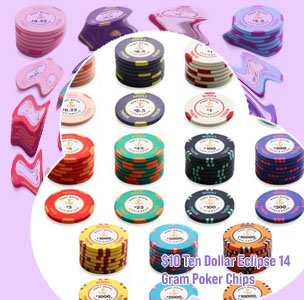When hosting a home poker game, determining the starting chip amount for each player is crucial to ensure a fair and enjoyable experience. There are various factors to consider when deciding on the appropriate chip distribution, such as the number of players, the length of the game, and the skill level of the participants. To help you make an informed decision, here are three articles that provide valuable insights and tips on how to set up the starting chips for your next home poker game.
How to Calculate the Perfect Starting Chip Stack for Your Home Poker Game

Poker is a popular card game played by millions of people worldwide, whether in casinos, online platforms, or home games. One crucial aspect of hosting a successful home poker game is determining the starting chip stack for each player. The starting chip stack sets the tone for the game and can significantly impact the overall experience for all participants.
Calculating the perfect starting chip stack involves considering several factors, including the number of players, the length of the game, and the blinds structure. A common recommendation is to start with 50-100 big blinds per player to ensure a healthy amount of play. For example, in a game with 6 players and blinds starting at 25/50, a starting chip stack of 5,000-10,000 chips per player would be suitable.
Moreover, it is essential to adjust the starting chip stack based on the skill level of the players. In games with more experienced players, a larger starting stack may be appropriate to allow for more strategic play and decision-making.
In conclusion, calculating the perfect starting chip stack for your home poker game is crucial for creating a balanced and enjoyable playing experience. By considering the number of players, blinds structure, and skill level, you can ensure that all participants have a fair chance to showcase their abilities and enjoy
Tips for Setting Up a Balanced Starting Chip Distribution in Your Home Poker Tournament
Setting up a balanced starting chip distribution is crucial for the success of any home poker tournament. A well-thought-out chip distribution can help ensure that the game is fair and enjoyable for all players involved.
One popular method for setting up a balanced starting chip distribution is the "T25 rule." This rule suggests starting players with 25 times the big blind in chips. For example, if the big blind is 25 chips, each player should start with 625 chips. This distribution allows for enough chips for players to make strategic plays without risking elimination too quickly.
Another important factor to consider when setting up a balanced starting chip distribution is the total number of chips in play. A good rule of thumb is to have enough chips in play so that each player starts with at least 50 big blinds. This ensures that there is enough playability in the game and prevents players from being forced all-in too early.
In conclusion, setting up a balanced starting chip distribution is essential for a successful home poker tournament. By following the T25 rule and ensuring that each player starts with at least 50 big blinds, players can enjoy a fair and competitive game. This article is important for anyone looking to host a home poker tournament and wanting to ensure that the game runs smoothly and fairly.
Factors to Consider When Determining the Starting Chip Amount for Your Home Poker Game
When hosting a poker game at home, one of the most important decisions you'll need to make is determining the starting chip amount for your players. This can greatly impact the flow and dynamics of the game, so it's crucial to consider a few key factors before settling on a specific amount.
-
Number of Players: The first thing to consider is how many players will be participating in the game. The more players you have, the more chips you'll need in circulation to ensure that everyone has a fair chance at winning.
-
Skill Level of Players: Another important factor to consider is the skill level of your players. If you have a group of experienced players, you may want to start with a higher chip amount to accommodate for longer playing sessions and more strategic gameplay.
-
Length of Game: The duration of your poker game is also an important factor to take into account. If you're planning on hosting a quick game, you may not need as many chips as you would for a longer, more competitive game.
-
Blind Levels: The blind levels in your game will also impact the starting chip amount. Higher blind levels will require more chips to start with in order to keep the game balanced and fair for all players.
-
Personal Preference: Ultimately, the starting
